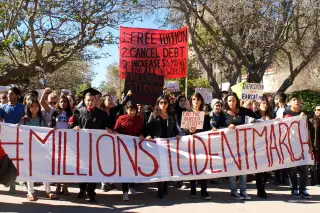The Million Student March Protesters Say They're Just Getting Started

Thousands of students across the country took to their quads on Thursday to protest rising student debt. The event marked what student activists say is the beginning of a nationwide grassroots movement.
The demands of individual groups within the Million Student March varied. But nationally, the students want free public college tuition, a $15 minimum wage for all college campus employees, and the cancellation of outstanding student debt, all paid for through a tax on Wall Street transactions.
Turnout varied, from, for example, roughly 20 students at Oakland University in Michigan to 300 at the University of Pittsburgh, according to campus newspapers. The related hashtag, #MillionStudentMarch, had nearly 70,000 mentions on Twitter Thursday. And in many places, including the combined march in Philadelphia of students from Drexel University and University of Pennsylvania, the movement got a boost from protesters marching in solidarity with black students at the University of Missouri-Columbia to push for better treatment of minority students.
Kyle Butts, a student organizer at University of California-Santa Barbara who also helped on the march's national organizing committee, said the group purposely identified simple, precise demands so it was clear what they wanted policymakers to address. He estimated that about 1,500 students participated in the march on his campus.
Butts is attending UC-Santa Barbara as an out-of-state student from Connecticut. About half of his cost of attendance is covered through scholarships and grants, but he says he's still taking out $30,000 in loans each year to cover tuition, fees, books, and living expenses.
When asked if the ambitious goals of the group were purposely set high simply to make a statement, Butts said no, and that he thinks they're achievable. A $15 minimum wage is already a reality in many places, and Democratic presidential candidate Bernie Sanders has introduced a bill in the U.S. Senate that would tax Wall Street and use some of the revenue to provide students with a free public college option, Butts said.
"We're not delusional and think that this one day of action creates solutions," he said. "But our goal was to create a national dialogue about this topic. This was just stage one."
Much of that dialogue—at least on social media—wasn't necessarily supportive of the protesters' aims. On Twitter and Facebook, commenters described them as whiny, entitled, and yes, even delusional, suggesting they'd have more of a shot of finding unicorns or a pot of gold at the end of the rainbow.
There's no such thing as "free," many said, and one of the national organizers, Northeastern University student Keely Mullen, was widely criticized by conservatives for her answers during an interview with Neil Cavuto on Fox Business.
Organizers, who received support from various activist groups and unions to raise awareness for the march, said they weren't discouraged.
Brianna Tong, an organizer for IIRON Student Network in Chicago, said the economy today is different from what it was 20 or 30 years ago, when you could work your way through college, or pay off your loans with a few years of post-college earnings, or even get a solid middle-class job without going to college. That's not the reality anymore, she said.
Regardless of whether you agree with the idea of free college, it is worth noting that several reports show college has never been more unaffordable. It's nearly impossible to work your way through college, and wages, state funding, and financial aid haven't kept up with the pace of rising costs.
The next stage, Butts said, is pressuring political candidates during next year's election to take up these demands as part of their platforms. He hopes to see students and their supporters live tweeting during the Democratic debate Saturday, urging candidates to answer a yes or no question: Do you agree with the Million Student March demands?
Sanders, whose earlier comments about young people marching and demanding free tuition inspired students to start organizing Thursday's march, already has a higher education platform that would meet one of the group's demands: free public college tuition. He also appeared to support the event Thursday on Twitter:
If we could bail out Wall Street, we can make sure every American has access to public colleges regardless of income. #MillionStudentMarch
— Bernie Sanders (@BernieSanders) November 12, 2015
Butts said there will be further student protests during the spring semester, and Tong promised additional campaigns to reduce college costs directed at national policymakers, state legislators, and college officials..
"Taking thousands of people to the door of the decision makers on these issues—that's how we start getting change," she said.
Read Next: Student Protesters Nationwide Demand Free Tuition, $15 Minimum Wage, No Student Debt